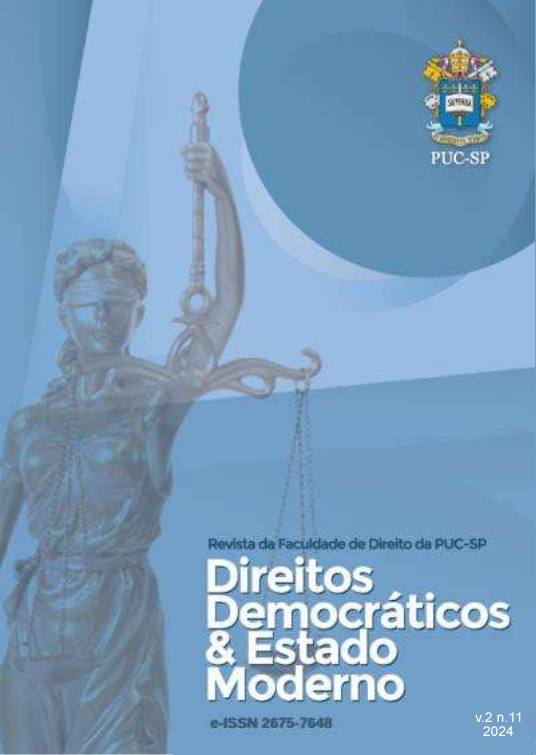Civil liability in the digital environment and its relationship with freedom of expression in light of contemporary Brazilian legislation
DOI:
https://doi.org/10.23925/ddem.v.2.n.11.65282Keywords:
fundamental rights, citizenship, Federal Constitution of 1988, civil liability, censorshipAbstract
This article seeks to analyze the potential results of the intersection between the civil liability model attributed to companies providing platforms or digital services in Brazil and the fundamental right to freedom of expression, aiming to assess whether this relationship could result in a violation of this right. Initially, the national constitutional treatment of freedom of expression as a fundamental right is analyzed, with an emphasis on historical precedents of national order and the international normative field that potentially influenced the Original Constituent of 1988. Subsequently, the assessment of current regulatory legislation of the digital environment - embodied in Law 12.965/14, the Civil Rights Framework for the Internet - and comparison with its foreign equivalents. Finally, the objective is to understand the international and Brazilian perspectives on regulation and adoption of civil liability models for digital platform providers. The research was conducted through a bibliographic and documentary review of relevant standards, scientific articles and legal doctrine. It was concluded that the exercise of citizenship and the right to freedom of expression, at the same time, are inseparable from free access to the internet and digital platforms, and, although legislative adjustments to the topic are necessary, in Brazil, changing the model of civil liability currently adopted can cause offenses against freedom of expression and, therefore, other fundamental rights that are attached to it.
References
BARROSO, L. R. Curso de direito constitucional contemporâneo. 11. ed. São Paulo: Saraiva, 2023. E-book.
BARROSO, L. R. Colisão entre Liberdade de Expressão e Direitos da Personalidade. Critérios de Ponderação. Interpretação Constitucionalmente Adequada do Código Civil e da Lei de Imprensa. Revista de Direito Administrativo, v. 235, p. 1–36, 2004. Disponível em: https://periodicos.fgv.br/rda/article/view/45123. Acesso em: 26 jun. 2023.
BRASIL. Constituição da República Federativa do Brasil de 1988. Promulgada em 5 de outubro de 1988. Congresso Nacional. Disponível em: https://www.planalto.gov.br/ccivil_03/constituicao/constituicao.htm. Acesso em: 14 out. 2023.
BRASIL. Decreto nº 592, de 6 de julho de 1992. Atos Internacionais. Pacto Internacional sobre Direitos Civis e Políticos. Promulgação. Presidência da República, Brasília, DF, 1992. Disponível em: https://www.planalto.gov.br/ccivil_03/decreto/1990-1994/d0592.htm. Acesso em: 14 out. 2023.
BRASIL. Lei nº 12.965, de 23 de abril de 2014. Estabelece princípios, garantias, direitos e deveres para o uso da Internet no Brasil. Congresso Nacional, Brasília, DF, 2014. Disponível em: https://www.planalto.gov.br/ccivil_03/_ato2011-2014/2014/lei/l12965.htm. Acesso em: 14 out. 2023.
BRASIL. Projeto de Lei nº 2.630 de 2020. Institui a Lei Brasileira de Liberdade, Responsabilidade e Transparência na Internet. Câmara dos Deputados. Brasília, DF. Disponível em: https://www.camara.leg.br/proposicoesWeb/fichadetramitacao?idProposicao=2358879. Acesso em: 14 out. 2023. Texto em tramitação legislativa.
COMISSÃO DE PRIVACIDADE, PROTEÇÃO DE DADOS E INTELIGÊNCIA ARTIFICIAL DA OAB SP. Comissão de Privacidade, Proteção de Dados e Inteligência Artificial da OAB SP manifesta preocupação quanto ao PL 2630/2020. Jornal da Advocacia da OAB São Paulo, 27 de abril de 2023. Disponível em: https://jornaldaadvocacia.oabsp.org.br/noticias/comissao-de-privacidade-protecao-de-dados-e-inteligencia-artificial-da-oab-sp-manifesta-preocupacao-quanto-ao-pl-2630-2020/. Acesso em 12 set. 2023.
FRITZ, K. N. Europa regula o mercado de serviços digitais. German Report Migalhas, 21 de março de 2023. Disponível em: https://www.migalhas.com.br/coluna/german-report/383304/europa-regula-o-mercado-de-servicos-digitais. Acesso em: 12 de set. 2023.
KAUFMAN, D.; SANTAELLA, L. O papel dos algoritmos de inteligência artificial nas redes sociais. Revista FAMECOS, [S. l.], v. 27, n. 1, p. e34074, 2020. Disponível em: https://revistaseletronicas.pucrs.br/ojs/index.php/revistafamecos/article/view/34074. Acesso em: 25 maio 2023.
LA RUE, Frank. Relatório do Relator Especial sobre a promoção e proteção do direito à liberdade de opinião e expressão. Conselho de Direitos Humanos da Organização das Nações Unidas, 2011. A/HRC/17/27. Disponível no original em inglês em: https://documents-dds-ny.un.org/doc/UNDOC/GEN/G11/132/01/PDF/G1113201.pdf?OpenElement. Acesso em: 14 set. 2023.
MCHANGAMA, J.; FISS, J. The Digital Berlin Wall: How Germany (Accidentally) Created a Prototype for Global Online Censorship. Justitia, 2019. Dinamarca. Disponível em: http://justitia-int.org/wp-content/uploads/2019/11/Analyse_The-Digital-Berlin-Wall-How-Germany-Accidentally-Created-a-Prototype-for-Global-Online-Censorship.pdf. Acesso em: 29 abr. 2023.
POLETTO, Álerton Emanuel; SANTOS DE MORAIS, Fausto. A moderação de conteúdo em massa por plataformas privadas de redes sociais. Prisma Jurídico, [S. l.], v. 21, n. 1, p. 108–126, 2022. Disponível em: https://periodicos.uninove.br/prisma/article/view/20573. Acesso em: 25 maio 2023.
Downloads
Published
How to Cite
Issue
Section
License
Copyright (c) 2024 Democratic Rights & Modern State

This work is licensed under a Creative Commons Attribution 4.0 International License.
This work is licensed under a License Creative Commons Atribuição 4.0 Internacional.
The authors grant the journal all copyrights relating to the published works. The concepts issued in signed articles are the absolute and exclusive responsibility of their authors.
DD&EM Magazine - ISSN 2675-7648

















